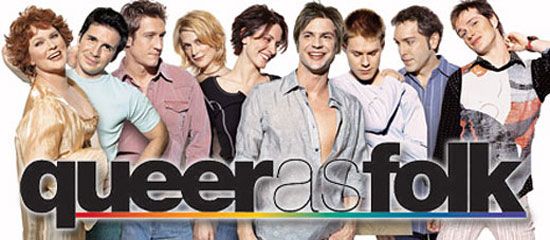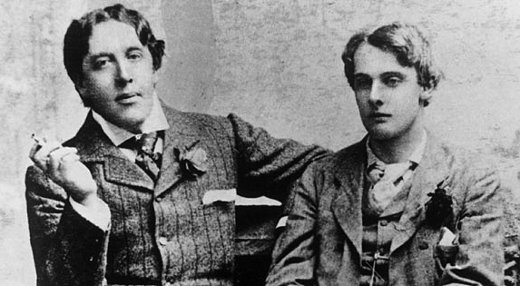In
northern
England, the
wee corner of the world I call home (actually, I often call it hyam,
but that’s a whole other discussion) we have a phrase, “there’s
nowt so
queer as folk”, meaning that there’s nothing quite so odd,
eccentric, strange, unusual, unique, funny as people are. I was
yacking
away
a
few days back
with a dear friend and serial brain-lightbulb catalyst of mine and I
used the word queer in this sense. She said that young people around
here (‘here’
being the eastern seaboard of the USA) don’t use the word that
way any more, and that got me to thinking (always a dangerous thing to
do).
 |
| The 1999 British TV series Queer As Folk did much to challenge taboos about homosexuality in the UK |
The
word ‘queer’, in its ‘unusual’ sense, first turns up in
writing in 14th century Scots, possibly from Low German
and related to the word ‘quer’, which my German-English
dictionary tells me now means ‘transversely’ (Lesbian, Gay,
Bisexual, Transverse anyone?).
By
at least the 19th century it had gained certain pejorative
senses, such as ‘unwell’ or ‘in financial difficulty’. In
the 1904 Sherlock Holmes story “The Adventure of the Second Stain”
(Twice in one night! Good work, old boy!), Inspector LeStrade
threatens an unruly police constable with dismissal by saying they
would “find [themselves] in Queer Street” (using the modern sense
of the term, that sounds like rather an enjoyable Friday night).
 |
| The Marquess of Queensberry - as charming as he was well-lettered. |
One
of the earliest references to “queer” in its meaning of same-sex
attraction, was in an 1896 letter by John
Sholto Douglas, the
9th
Marquess of Queensberry,
famous for publicly
endorsing the ‘Queensbury Rules’ that form the basis of modern
boxing and for bringing about the arrest of Oscar Wilde for “posing
as a somdomite” (clearly spelling was not Queensberry’s strong
suit) by
living
as a couple with Queensberry’s son Lord Alfred ”Bosie” Douglas.
 |
| Oscar and Bosie |
The
letter referred to “snob queers like Rosebery”, speaking of the
splendidly monikered Archibald Primrose, 5th
Earl of Rosebery, who Queensberry
suspected
of being one of his son’s lovers.
 |
| Archibald Primrose |
Throughout
the 20th
century, the term queer was used either euphemistically or abusively
to
refer to homosexual men. It was in the late 1980s that the process
of reclaiming the word began. “We’re here, we’re queer, we
will not live in fear” came to be a popular chant at gay rights
rallies.

A
pamphlet passed out at 1990’s NYC Gay Pride by the
organization
Queer
Nation explained
the reasons for taking up the term:
“Ah,
do we really have to use that word? It's trouble. Every gay person
has his or her own take on it. For some it means strange and
eccentric and kind of mysterious [...] And for others "queer"
conjures up those awful memories of adolescent suffering [...] Well,
yes, "gay" is great. It has its place. But when a lot of
lesbians and gay men wake up in the morning we feel angry and
disgusted, not gay. So we've chosen to call ourselves queer. Using
"queer" is a way of reminding us how we are perceived by
the rest of the world.”
And
it is true that to be queer is to be unusual, to
be abnormal. Less than
2% of the population in the UK and USA identify themselves as bi- or
homosexual (although
the percentage of those who’ve had some sort of same-sex dalliance,
tasted the cherry chapstick if you will, is almost certainly
considerably higher).
It’s also true that being left handed (around
10% of the population) is
queer (in its “nowt as queer as folk” sense),
as is having red hair (less than 2% of the world’s population) or
being black in the UK (3%) or Caucasian
in China (a small enough percentage to be classed as a trace
element). And
all of these minorities have suffered, or still suffer, various forms
of prejudice and discrimination.
But
normal, like natural, is a term that is often dusted with a patina of
positive connotation that it doesn’t warrant. Strychnine and arsenic are both natural, but I wouldn’t be overly inclined to
sprinkle a little on my organic, quinoa salad. In
a similar way, for the vast majority of history (and most probably
its illiterate older brother prehistory) slavery was normal, but that
doesn’t incline me to propose it as a handy solution to the irksome
problem of having to do tiresome domestic chores.
 |
| John Stuart Mill |
Indeed
I would contend that the increased tolerance of queerness, of not
being the norm, is one of the greatest achievements of the
enlightenment. The
philosopher John Stuart Mill’s corrective against the danger of the
tyranny of the majority inherent in the utilitarian ideal of
achieving “the greatest happiness for the greatest number”,
enshrining that an individual should be free to do whatsoever they
choose as long as it does not harm others, is a vitally important
underpinning of modern democracy.
“The sole end for which mankind are warranted, individually or collectively, in interfering with the liberty of action of any of their number, is self-protection. That the only purpose for which power can be rightfully exercised over any member of a civilized community, against his will, is to prevent harm to others. His own good, either physical or moral, is not sufficient warrant. He cannot rightfully be compelled to do or forbear because it will be better for him to do so, because it will make him happier, because, in the opinion of others, to do so would be wise, or even right...The only part of the conduct of anyone, for which he is amenable to society, is that which concerns others. In the part which merely concerns him, his independence is, of right, absolute. Over himself, over his own body and mind, the individual is sovereign”
John Stuart Mill, On Liberty (1859)
At a time when acceptance of homosexuality is thankfully on the rise in many parts (though by no means all, I’m looking at you Uganda) of the world, but tolerance of other forms of diversity of action and opinion is in great danger of being clamped down on, I would make the modest proposal that embracing queerness, in all of its senses, is something we would do well to encourage.

